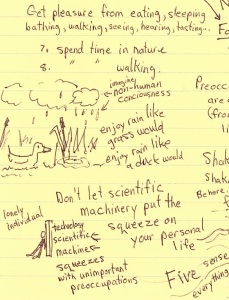People dedicated to enjoyment enjoy the moment. Of course they do! They make the most of the moment even when it isn’t enjoyable. They imagine future enjoyment. They remember past enjoyment. They laugh instead of get mad (the double h of humour and humility) and they do it all without disgustingly fake good cheer.
Practitioners of enjoyment force themselves to enjoy no matter what’s happening. They know drudgery is necessary. Bumps are expected and tragedy strikes.
Dedicated enjoyers get into simple pleasures. They linger on ladybugs. They look out windows. They stare at the world like idiots and go into earth-trances. They squeeze enjoyment out of empty ketchup packets.
If someone is not dedicated to enjoyment, enjoyment is accidental or nonexistent. The question then becomes: Why? Why leave enjoyment to chance? What’s more important? Is it a job? Is it family? Is it foreign policy?
If someone isn’t enjoying, it could be: a) the person is dedicated to enjoyment without knowing it and thus not doing a very good at it, or b) dedicated to something that is not enjoyable.
For person a) we need to look at how a person spends her day. Is time taken to contemplate nature and/or whatever? Are hot beverages sipped slowly with much noise? Does the person send mixed messages by wanting and not-wanting at the same time?
For person b) we recommend a careful examination of the following question: Why be dedicated to something not enjoyable?
 Enjoyment comes from the self. Imagine that the words you are reading right here and now are actually coming from you. These are your words. It is your silent voice you hear.
Enjoyment comes from the self. Imagine that the words you are reading right here and now are actually coming from you. These are your words. It is your silent voice you hear.
Someone, somewhere, writes in the present for you to receive in the future and remember in the past. Past, present, and future are thus not compartmentalized – they are one, like a river is one. Water upstream is not separate from water downstream. It’s one body from beginning to end. The same is true of time and your life. It is one event from beginning to end. It is a flowing. Your shape changes and thoughts come come and go, but the consciousness within is consistent.
If words of enjoyment come from you, you will obey. You cannot be told to enjoy. That doesn’t work. Enjoyment must come from your own motivation.
Words from the Philosophy of Enjoyment are like arrows shot into the air. By a fluke of chance, they hit you. They hit with a reminder: Keep enjoyment foremost. Cultivate happiness. No one else will to do this for you. This is you we’re talking about – not some abstract notion of a person. You! You looking at this. Right now! This is your mirror. These are your thoughts you hear.
Keep enjoyment on your mind like that Willie Nelson song, Always On My Mind. You are enjoyment. Disappear into it and keep in mind a few pointers along the way:
1) Enjoyment doesn’t come with negative consequences. If if does, that’s not enjoyable. (It’s an old Epicurean idea.)
2) Avoid being like the person in the Irving Berlin song, After You Get What you Want You Don’t Want It. Want what you get. Be selective. Keep it simple and in tune with nature and yourself.
3) Don’t think about what you don’t want. Anything that you don’t want can make you feel bad. Feeling bad is not enjoyable.
If you think about how you don’t want cancer or your friend to die or for you to twist an ankle, that’s a bummer. You cause yourself suffering by thinking about what you don’t want. Hypothetical stories feel real. Worry circles around and you cook up a bad-tasting stew.
4) Avoid mixed messages. If you decide to have ice cream and make arrangements, but then worry that ice cream is bad for you, that’s a mixed message. Not enjoyable. If you want ice cream. Enjoy ice cream. A treat is a treat. Too much isn’t enjoyable. A special meal isn’t the time to worry about money. Commit to enjoy.
5) If you’re not enjoying yourself, ask: why? Contemplate enjoyment. Become an expert in it. There’s nothing supernatural or selfish about it. Enjoyment is there.
Make yourself enjoy. It starts here and now with sensual awareness and contemplation. When you feel real enjoyment in simple things that are easy to get like a ladybug on a blade of grass, you are home, even when you’re not.

